
 |
War on illiteracy has to be fought in ways that are appropriate for the target groups. Lily Foundation has been collecting data over the years from its own schools and made on-site surveys in various parts of cities and suburbs about the target group's profession, living style and attitude. The foundation fights the problem in four different ways:
Group 1 [Basic Literacy Group]
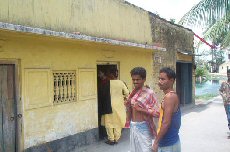 |
| school site |
Low income group families are generally run by men who are ricksha pullers, taxi drivers, street vendors or hawkers by profession. They earn just enough money to live in modest homes, often just a room with shared facilities. When families are run by women (often abandoned by husbands or husbands are deceased) they are maid-servants or vegetable vendors. Such familes generally send their first one or two children to state-run schools (or madrasas in some neighborhoods). But when the number of children in the family increases to four, five or six, then the head of the family cannot run it by one income, and so must send some chidren to work instead of schools. Thus, children are forced to become illiterate laborers, often working in tea-stalls or helping adults in small trades, such as tailoring.
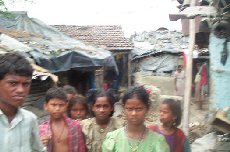 |
| potential students |
The lower-yet (practically no) income group people live in small mud-huts or enclosures made of cardboard boxes or discarded woods along the railway tracks. Without access to public running water facilities, they often bathe in or use extremely filthy and often poisoned pond-water. It is not uncommon that without discrimination people and street animals (cats and dogs) live together under the same roof. Parents as well as kids do drugs or resort to gambling with any little money they might manage to earn through manual labor, prostituion or begging. These types of families never think of sending children to school.
Lily Foundation establishes free basic primary schools [AALO Study Homes] in selected neighborhoods. Kids get free snacks in addition to instructions. Each class is limited to 20 kids for one teacher. The subjects taught are native language, some English and Math. Parallel to Study Homes, the foundation establishes free primary coaching centers for Gr 3 through 5 mainstream students[AALO Primary Coaching Homes] to assist in homeworks. This way, the drop-out rates reduces at Grade 5.
Group 2 [High School students - ranked LOW]
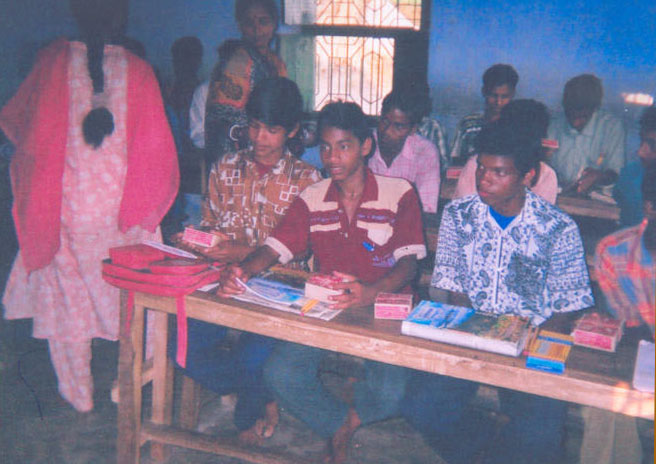 |
| Dhulai Dishari |
Mostly in villages where illiteracy is relatively high among poor families, there are high school students who barely pass (or at times don't pass) some subjects. Without coaching help it is fairly certain that these students cannot clear the high school barrier.
Lily Foundation wants the children belonging to poor families - particularly families who historically have been poor for generations - to break the poverty cycle by earning more, which typically comes with good education.
Lily Foundation establishes Coaching Homes [AALO HS Coaching Homes] where some 20/25 students in each Home can get free special coaching in selected subjects in class-room environment.
Group 3 [High School students - ranked HIGH]
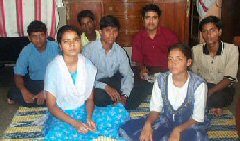 |
| scholar group |
There are families in villages or small towns whose parents are normally engaged in seasonal farming help or have low-paying government or private jobs. Occasionally, some own very small businesses of their own. Usually, they have to maintain large families, commonly four to eight people including ailing grand-parents and distant relatives without shelter.
In these families, parents occassionally have a low-level education themselves but are unable to find decent-paying jobs with that education, that would enable them to spend toward their children's education. Sometimes children from these families do well in high school. But, they would do much better if they received encouragement and support in buying aditional books, in engaging a private tutor for one or two weak subjects or in meeting miscellaneous other expenses. With external support available for the children, parents would likely be prevented from pulling back the children without completing the high school.
Lily Foundation has scholarship plan [SMILE] designed for such students, who come from poor families but are able to place themselves in top 50% of the class.
Group 4 [High School students - Job Skill development]
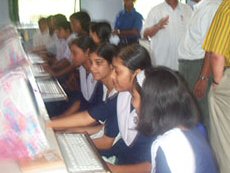 |
| hooked to the tool |
India is known for its software expertise around the world. So-called advanced nations now all outsource software jobs to india. But unfortunately, the software-knowledgeable people are localized in a handful of big cities. The fruits of India-shining are enjoyed only by an elite few.
For vast part of the country, however, there is no opportunity for learning computers in schools. Paradoxically, without computer exposure, it is difficult to land an office or industry job for a high school graduate – even in India. For those students who go for higher education in colleges, a computer-trained background provides a confident platform to leap into the realm where search for knowledge from libraries around the world never stops. Responding to the need, Lily Foundation ventures to establish computer learning centers [Computer Center] in small-town high schools or in leased or wholely-owned buildings.
The other recent venture-project is a vocational center where low-income family adults learn tailoring which helps women to earn money from home and subsidize the family income.
Our activities are spread over many parts of the country. To view the shined area click Impact India.
To find the project locations,
click Action Zone.
| Warfronts/ Scholarship/ StudyHome/ CoachingHome/ ComputerCenter/ IndiaTeams/ ContactIndia |
This page is current as of 17-June-12
| Home | Scholarship | Schools | Feed-the-Needy | Activities | Lily India | About Us |